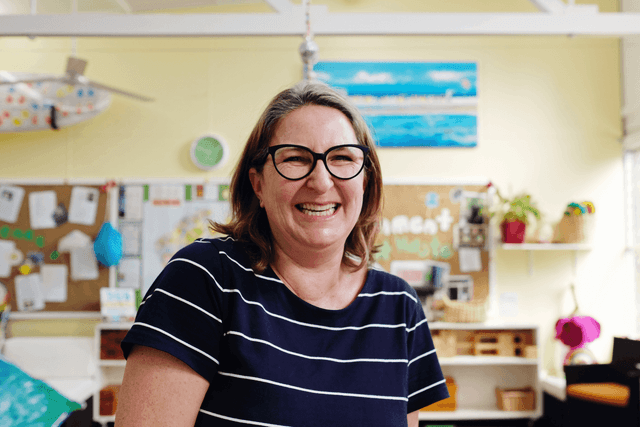General News
In The Field
Practice
Embracing diversity: Inclusive practice for children with high support needs

Freya Lucas
Oct 25, 2024
Save
Earlier this year, a child who has significant support needs enrolled at Box Hill North Montessori Academy. We sat down with Kellie Anne Harris, the centre manager at the time, to learn about how she and the educators leapt into action with a flexible approach to inclusion despite having not come across the condition before.
Box Hill North Montessori Academy is a 108-place long day care service located in one of Melbourne’s fastest-growing suburbs. Montessori programs aim to help children become independent learners. But what does this look like when a child has high support needs?Early communication and collaboration
Oliver*, who has high support needs, wasn’t the first child from his family to enrol at the service, so educators already knew his family when he started. While this paved the way for a positive inclusion journey, it was still the educators’ first exposure to the inclusion challenges presented.
Present from birth, Oliver’s genetic condition can often result in developmental delays and physical complications. In Oliver’s case, his high support needs include feeding, communication, sleeping and mobility.
‘It’s actually something I hadn’t come across before,’ says Kellie Anne. ‘We had to spend a lot of time researching and putting together risk management plans and communication plans to ensure that we knew exactly how he needed to be supported.’
In addition, Kellie Anne organised a care team meeting with all of the child’s allied health professionals. These included his physiotherapist, occupational therapist, speech therapist and feeding therapist.
‘We got everyone together on a Zoom call – [it] was quite lucky to get them all at the same time. I understood that I had a duty of care to [Oliver] and wanted to know how to [include him] in the best way possible. So that’s how we started his enrolment.’
Oliver’s allied health professionals have attended every week since he started. This creates a collaborative learning environment where staff at the service can learn new skills. ‘The educators sit with them to develop knowledge and skills while learning how to communicate and support his needs,’ Kellie Anne explains.
Engaging with an Inclusion Professional
Educators collaborated with their Victorian Inclusion Agency (VIA) Inclusion Professional, Dee, on how to best include Oliver. Firstly, Dee facilitated the implementation of an Immediate Time Limited funding plan. Through this funding plan, a service can apply for support once for an individual child, for up to a 12-week period and for a maximum of 150 hours.
Dee explained to the service that they could use the allocated hours over 100 days to support Oliver and the educators. ‘This was amazing because it was something I didn’t actually know we could do. So that meant we were able to get an additional educator as soon as possible,’ says Kellie Anne.
It also meant that Oliver had enough educator support to be meaningfully included in the learning environment. This, in turn, helped Oliver’s family return to work with the extra hours and support Oliver was able to receive through the funding plan.
One big challenge for the educators was finding the right equipment for Oliver’s mobility needs. Dee suggested they use the VIA’s Specialist Equipment Library (SEL) to get equipment that would help with sitting, eating and sleeping. Oliver’s physiotherapist then ordered the equipment Oliver would need in different settings.
‘It’s been so lovely that everybody has the same goal and the same purpose. They want him to be supported and included in every aspect. Everyone has different opinions of how that should be done, but they all work together. It’s been a really nice collaboration between families, allied health professionals and educators’, Kellie Anne explains.
Accessing resources and materials
Through the SEL, educators accessed similar equipment to what Oliver uses at home (gained through his NDIS funding) to support his development. Resources like a play pack allowed Oliver to engage with peers at their level and also provided versatility for indoor and outdoor use.
Initially, Oliver was in a stroller that was at quite a high level. This was a barrier because he was up high while the other children were quite low. Kellie Anne says, ‘He [couldn’t] see his peers, he [couldn’t] play with them and he [couldn’t] pick up the toys or communicate in his way. So the play pack has allowed him to do that because now he can get down to floor level, which is really lovely to see.’
In addition to the resources accessed through the SEL, Oliver also uses a personal piece of equipment which supports his mobility and core strength, allowing him to hold himself up for longer periods. As a result, he can now sit with children at meal times, story time and group times.
Inclusion can be diverse!
Collaboration, flexibility and willingness to learn have helped educators support Oliver’s needs. However, Kellie Anne explains that whether a child has additional needs or high support needs, the main goal is to understand each child’s personality and to ensure they feel comfortable and included in their own way.
Kellie Anne says that Oliver is ‘vocal about where he does and doesn’t want to be, and that’s something that has really helped. It’s about getting to know that child’s personality and their needs and their wants. Sometimes inclusion can look different.’
Have you heard about the Specialist Equipment Library (SEL)? It’s free! Through the SEL, you can loan equipment that allows children with disabilities or additional needs to participate in your daily program and activities. Contact your VIA Inclusion Professional for more information on 1800 177 017
*This name is used as a pseudonym throughout the article to respect the privacy of the child.
This article was originally published in the spring 2024 edition of Embrace magazine and has been reshared here with permission.
Don’t miss a thing
Related Articles



















